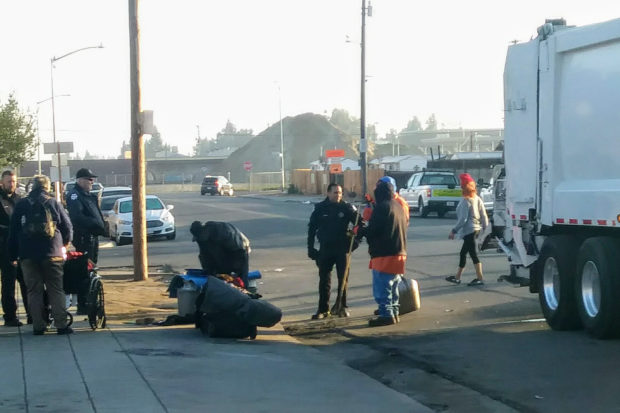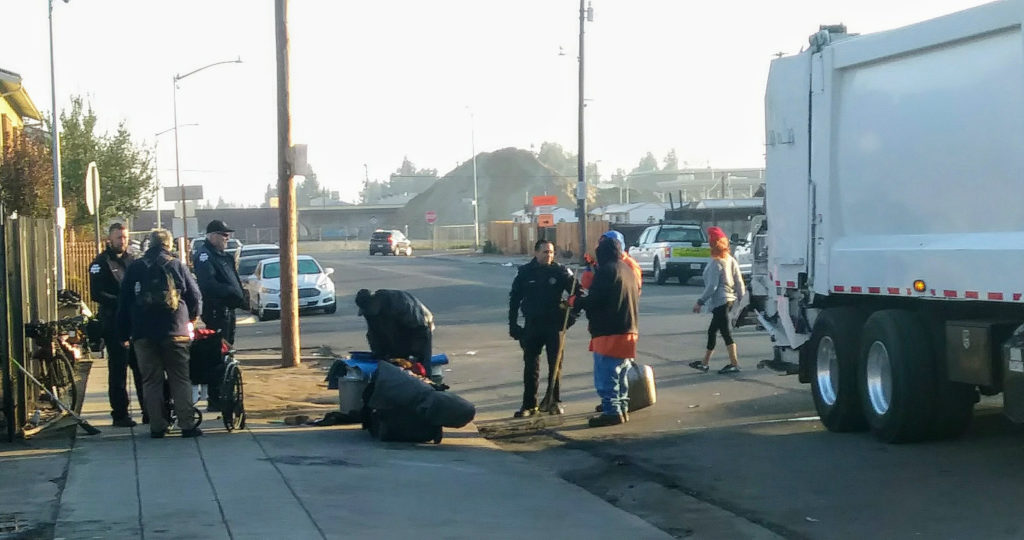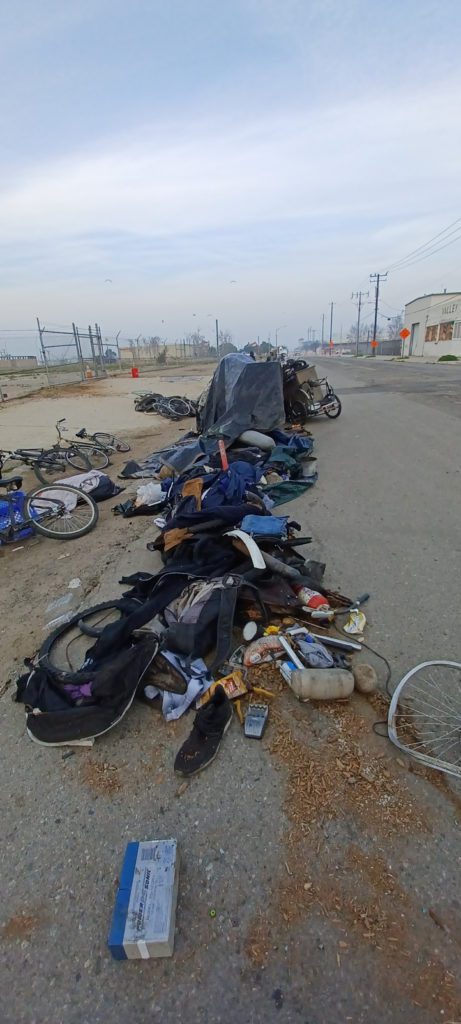

As the City of Fresno continues to break up homeless encampments, refuses to keep warming centers open and fails to provide basic sanitation, the mayor, the City Council and the city attorney are spending public resources on ways to further criminalize the homeless and criminalize advocacy.
On Feb. 17, the City Council, rejecting the public comments of a few dozen speakers, voted unanimously for an amendment to cite and/or arrest anyone in an “abatement zone” area when the City is doing encampment “sweeps” or “trash removal.” The pertinent sections of the abatement amendment are as follows:
No person shall obstruct, impede or interfere with any officer, employee, contractor or authorized representative of the city whenever such person is engaged in the work of abatement, pursuant to the provisions of this article, or in performing any necessary act preliminary to or incidental to such work or authorized or directed pursuant to this article.
(1) To protect the health and safety of the public and city employees while an abatement is in progress, city employees or a retained contractor may designate a restricted area by erecting a barrier or cordon off an area of public or private property where an abatement is taking place. No person shall enter the restricted area without express authorization from city employees or contractor on site conducting the abatement…
(2) …those persons providing services to the occupants or advocating on their behalf shall be permitted a reasonable time to make contact with the occupants and assist prior to the area being secured…
(3) Unauthorized entry into the restricted area or other violation of this section shall be punishable either as a misdemeanor for intentional violations, or as an administrative citation with administrative penalty of up to $250.
Below are excerpts from a letter by Anthony Prince, counsel for the California Homeless Union and the Fresno County Homeless Union, on the City’s efforts to further criminalize our unhoused brothers and sisters. Unhoused residents of encampments could be cited and arrested.
The City is also doing this to keep advocates out of encampments when the police, code enforcement and other staff are abusing the camp residents. One definite form of abuse is throwing away personal property when these “abatement” sweeps occur.
Excerpts from the letter:
Should the Ordinance pass as proposed, we will pursue all available legal remedies, including application for a temporary restraining order and preliminary injunction barring its enforcement. We will also seek injunctive relief and a declaratory judgment that the Ordinance, if passed, violates on its face the First, Fourth, Eighth and Fourteenth Amendments to the Constitution of the United States as well as applicable provisions of the California State Constitution.
The cordoning off of areas broadly described as “public or private property where an abatement is taking place,” will result in restricting access of those who need or wish to closely observe administrative abatements so as to assist persons whose property may be at risk of seizure and destruction and who may themselves be subject to physical abuse, arrest, ejectment and deprivation of due process. Kept at what could be considerably more than “arm’s length” distance from such “abatements”—commonly known as homeless “sweeps”—legal observers, members of the media, independent journalists, representatives of those being “swept” and interested members of the community would be unable to observe, let alone provide assistance or representation. In addition, the amendment essentially deputizes civilian employees and private entities to perform what would essentially be law enforcement functions further increasing the risk of arbitrary deprivation of constitutionally protected rights to would-be witnesses, documentarians, and legal representatives.
To the extent that individual members of the Fresno City Council may believe that a legislative privilege shields them from individual liability, such immunity only applies when members are performing a legitimate legislative function. In our view, the proposed ordinance is a barely disguised effort to conceal and avoid accountability during the performance of a public function, be it legitimate or pre-textual, i.e., the abatement of an alleged public nuisance. We do not consider consideration and enactment of the proposed amendment to be a legitimate legislative function and we will hold both the City of Fresno and individual elected officials—who, unlike public entities, may be liable for punitive damages should a jury determine they are appropriate. Again, this letter is only the first and not the last word we will have on this matter.
The recent sweeps laid bare the danger of police excessive force, unwarranted seizure and destruction of personal property belonging to our members and others in the homeless community and a wide range of other illegal abrogations of essential rights. To pass the proposed amendment to Fresno City Code Section 10-616 will only compound, ratify and “codify” such misconduct and will make the City of Fresno, the City Council and the individual members of the Council liable for all harms resulting therefrom. Accordingly, we urge the members of the City Council to reject the proposed amendment.

Instead of wasting resources, time and money on a code section that will be certainly challenged in a costly court battle, Fresno Mayor Jerry Dyer and the City Council could use the same resources to provide basic sanitation throughout the city and, at a minimum, to keep the two warming centers open all winter.
The warming centers (at the Fresno Mission and the Ted C. Wills Community Center) closed effective Feb. 8. They were kept open two weeks longer than first announced because of the efforts of homeless advocates, whose pleas to keep the centers open are now falling on deaf ears.
The City follows the Fresno Mission policy, which is to open the centers on nights when the temperature falls to 36 degrees or lower. This policy is not based on any empirical data or science. A human can suffer hypothermia or even death when the nighttime temperature is 40 degrees or even higher.
At the time of this writing, the nighttime temperature ranges from 38 to 41 degrees and is predicted to drop as low as 32 degrees on Feb. 22. As of now, there are no plans to reopen the warming centers.
Several homeless advocates spent three weeks providing rides for unhoused individuals using the Ted C. Wills Community Center to sleep warmly and safely. The center provides socially distanced cots in the gymnasium, restrooms (outdoors) and one or two staff/security persons. The majority are elderly and disabled, and the lack of empathy for them from the City and the County of Fresno is shocking.
Where are the County outreach workers to assess and support them? Why doesn’t the City staff up and use community centers for safe sleeping as long as needed? There is Covid emergency relief funding available. There are ARPA funds available. There is still a pandemic, and one has to question the sanity of city leaders when they show complete disregard for Centers for Disease Control and Prevention (CDC) guidelines.
The unhoused are at risk of suffering exposure and hypothermia. Many of them have no tents, sleeping bags or even blankets, and some have no warm jackets. The most common causes of hypothermia are exposure to cold-weather conditions or cold water. But prolonged exposure to any environment colder than your body can lead to hypothermia if you aren’t dressed appropriately or can’t control your body temperature.
Older adults are more likely to have a cold injury, especially hypothermia, because their normal body temperature might decrease with age, they can’t regulate their body temperature as well, they do not produce as much heat energy and have less body fat, their blood vessels do not narrow (constrict) and conserve body heat as easily, they do not shiver as much (shivering warms the body) and their mental awareness of changes in temperatures could change.
Some have medical conditions that increase their risk for hypothermia. Such conditions include arthritis, Alzheimer’s disease, diabetes, heart failure and poor nutrition. Many other medical and health conditions could contribute to cold injury and hypothermia as well.
The issues cited in this article are examples of how the City and County of Fresno deal with our unhoused brothers and sisters. They fail to provide even the minimum necessities to the unhoused, such as warm sleeping centers and restrooms, and they continue to criminalize the unhoused and their advocates.
*****
Bob McCloskey is a homeless advocate and a volunteer with the Fresno County Homeless Union. Contact him at bobmccloskey06@gmail.com.
************************************************
Take Action!
Step up as a community to challenge what the City of Fresno and Fresno County are doing or not doing relative to the homeless in our community. Contact the mayor, your City Council member and your supervisor. It only takes a few minutes.
